 Petzlover
Petzlover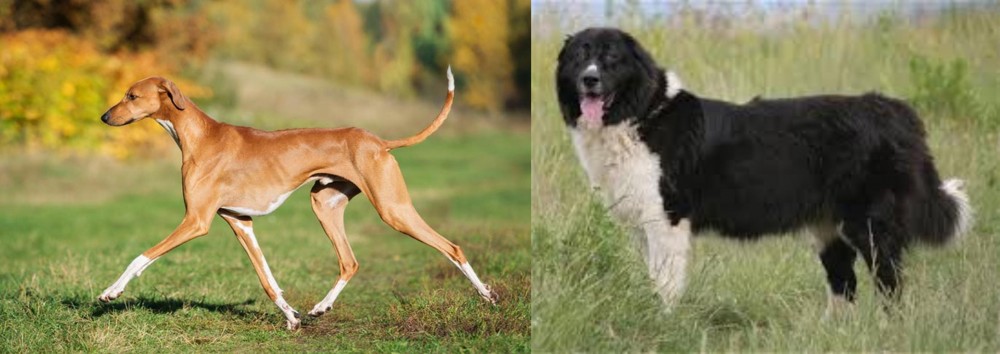 Azawakh is originated from Mali but Bulgarian Shepherd is originated from Bulgaria. Both Azawakh and Bulgarian Shepherd are of same height. Azawakh may weigh 32 kg / 70 pounds lesser than Bulgarian Shepherd. Azawakh may live 42 years less than Bulgarian Shepherd. Azawakh may have less litter size than Bulgarian Shepherd. Both Azawakh and Bulgarian Shepherd requires Moderate Maintenance.
Azawakh is originated from Mali but Bulgarian Shepherd is originated from Bulgaria. Both Azawakh and Bulgarian Shepherd are of same height. Azawakh may weigh 32 kg / 70 pounds lesser than Bulgarian Shepherd. Azawakh may live 42 years less than Bulgarian Shepherd. Azawakh may have less litter size than Bulgarian Shepherd. Both Azawakh and Bulgarian Shepherd requires Moderate Maintenance.
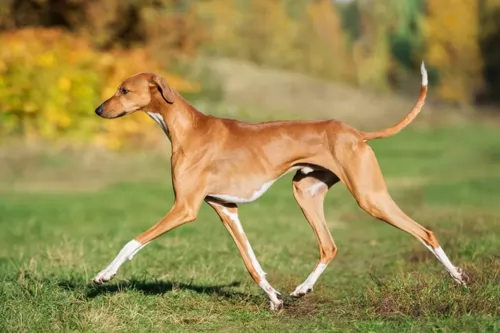 Azawakh dog was bred by the nomads in Africa. They were originally bred to be a guard dog. But, they realized that their body shape and bone structure allows them to run really fast (some say that they can run at the speed more than 65 km/h. This fact made them ideal for the hunting. Nowadays, they can be found across the globe but they are still very rare kind of a dog because they can survive and adapt to very high temperatures but they are very intolerant of low temperatures. Male Azawakh is slightly bigger than a female dog, with a greater instinct for guarding, hunting and taking care of the family and the pact.
Azawakh dog was bred by the nomads in Africa. They were originally bred to be a guard dog. But, they realized that their body shape and bone structure allows them to run really fast (some say that they can run at the speed more than 65 km/h. This fact made them ideal for the hunting. Nowadays, they can be found across the globe but they are still very rare kind of a dog because they can survive and adapt to very high temperatures but they are very intolerant of low temperatures. Male Azawakh is slightly bigger than a female dog, with a greater instinct for guarding, hunting and taking care of the family and the pact.
 The Bulgarian Shepard Dog comes from the ancient line of Molossers of Central Asia and Tibet, and the shepherds of the Balkans, Turkey and Caucasus. Among the oldest and most valued of the working dogs of Europe, the Bulgarian Shepherd breed was created by mixing the Balkan breeds with the dogs from Central Asia by the proto-Bulgarians around the 7th century. The Karakachanskoto Kuche was introduced to Bulgaria and accepted by the sheep herders. Mixing this breed in with the Balkan and Central Asian mix developed the Bulgarian Shepherd we know today. In the long run the original Karakachanskoto Kuche became extinct, replaced entirely by the Bulgarian Shepherd even in places where the new breed is still called by the Kuche name. Although the breeds are not the same, most of the dog world does not know the difference.
The Bulgarian Shepard Dog comes from the ancient line of Molossers of Central Asia and Tibet, and the shepherds of the Balkans, Turkey and Caucasus. Among the oldest and most valued of the working dogs of Europe, the Bulgarian Shepherd breed was created by mixing the Balkan breeds with the dogs from Central Asia by the proto-Bulgarians around the 7th century. The Karakachanskoto Kuche was introduced to Bulgaria and accepted by the sheep herders. Mixing this breed in with the Balkan and Central Asian mix developed the Bulgarian Shepherd we know today. In the long run the original Karakachanskoto Kuche became extinct, replaced entirely by the Bulgarian Shepherd even in places where the new breed is still called by the Kuche name. Although the breeds are not the same, most of the dog world does not know the difference.
In Bulgaria however the Karakachan is a national treasure and the history of the breed runs deep. One Kuche could run up to 1200 animals and hundreds were used by the herdsmen in the mountains of Bulgaria. There were many regional types of Bulgarian Shepherds with very little difference between those types. These dogs were so prized by the shepherds that the dogs ate first before the people. The dogs however ate a vegetarian diet of milk, wheat, water and oats. The Bulgarian Shepherd lives a long life of often over 20 years. The Bulgarian Army made good use of these dogs early in the 20th century.
Following World War II, the wolves were close to extinction and property in Bulgaria was nationalized. There was no longer a need for a large force of working dogs. The Communist government exterminated large numbers of sheep dogs including the Bulgarian Shepherd. Only those species on government owned farms and in remote regions survived. When the government farms were disbanded in the early 20th century, these dogs were exterminated as well. Only those in the mountains survived. Commercial breeding of the Bulgarian Shepherd in the end of the century has resulted in controversy as other breeds came into the breeding program.
Use of breeds such as Sarplaninacs, Caucasian Ovcharkas, St. Bernards, Central Asian Ovcharkas and Bosnian Tornjaks in these programs resulted in Bulgarian Shepherd or Karakachans that were a lot different from the original breed. There is therefore some concern about the future of the breed in Bulgaria, yet they received official Bulgarian national recognition in 2000. Today’s Bulgarian Shepherd is a guard dog for both property and livestock.
The official standard for the breed came about in 1991 and in 2005 it was recognized by the Bulgarian State Commission for Animal Breeds. Only those dogs that meet this standard are considered “true” Karakachans. The Bulgarian Shepherds are willing to fight bears and wolves in defense of its family and flock. The dog is brave and loyal, dignified and powerful. They are recognized by both the Dog Registry of America, Inc. (DRA) and the Bulgarian Republican Federation of Cynology (BRFC) a member of the FCI.
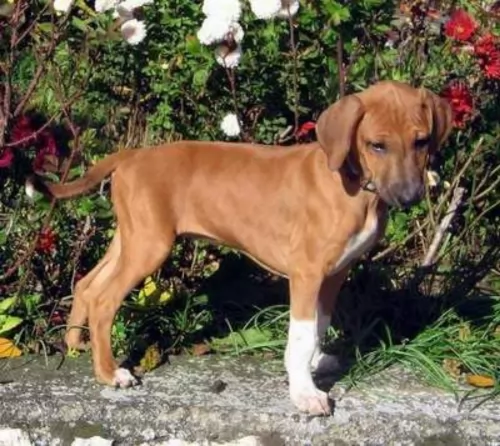 Azawakh is a large dog breed placed in a family of the hounds. It looks almost like any hound we know – slim, with long and skinny legs, with a big-boned chest with a stomach placed up with the spine. They have thin and a bit longer tail, narrow nose and small skull in a triangle shape. Their body may look skinny but it is just the way they should look. Actually, you could probably see the bone structure of the adult Azawakh because they, like any other hounds, have specific muscles – very thin and flat. They can be found in many coat colours like sand, fawn or dark fawn, even brown. Their coat is very short, usually with white marks on the neck, chest and all four paws. In Africa, Azawakh can be found in a diversity of colours.
Azawakh is a large dog breed placed in a family of the hounds. It looks almost like any hound we know – slim, with long and skinny legs, with a big-boned chest with a stomach placed up with the spine. They have thin and a bit longer tail, narrow nose and small skull in a triangle shape. Their body may look skinny but it is just the way they should look. Actually, you could probably see the bone structure of the adult Azawakh because they, like any other hounds, have specific muscles – very thin and flat. They can be found in many coat colours like sand, fawn or dark fawn, even brown. Their coat is very short, usually with white marks on the neck, chest and all four paws. In Africa, Azawakh can be found in a diversity of colours.
 A massive, powerful and muscular Molosser, the Bulgarian Shepherd is strong, agile, powerful and fast. They are intelligent and reliable. They have a long, thick, harsh coat in white with patches of black. Their skull is massive and broad with a furrowed forehead. The muzzle is massive as well while the nose has wide nostrils and is fairly large. It has close fitting, thick lips with strong, scissor bite jaws. The Bulgarian Shepherd’s eyes are deep, oblique and small. They are either hazel or dark. They have an intelligent and confident, yet firm almost grim expression.
A massive, powerful and muscular Molosser, the Bulgarian Shepherd is strong, agile, powerful and fast. They are intelligent and reliable. They have a long, thick, harsh coat in white with patches of black. Their skull is massive and broad with a furrowed forehead. The muzzle is massive as well while the nose has wide nostrils and is fairly large. It has close fitting, thick lips with strong, scissor bite jaws. The Bulgarian Shepherd’s eyes are deep, oblique and small. They are either hazel or dark. They have an intelligent and confident, yet firm almost grim expression.
Their ears are low set, small and v-shaped. They sit close to the head which sits on a powerful but short neck. They have a broad back, well-muscled body with a deep chest and long, rough tail. Their gait is a trot with a spring in their step. There are two types of coats – longhaired and shorthaired with no undercoats.
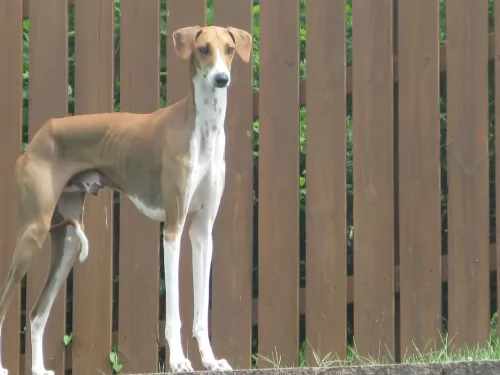 Once Azawakh is a part of the family, he will try to find his place. If you teach him that you are the main figure, they will be obedient and affectionate pet. They love children, and they will surely be always close to them, guarding them and making sure they are safe.
Once Azawakh is a part of the family, he will try to find his place. If you teach him that you are the main figure, they will be obedient and affectionate pet. They love children, and they will surely be always close to them, guarding them and making sure they are safe.
canine freestyle sports, heelwork to music competitions.
If your Azawakh pet is trained well and socialized, they can fit in almost anywhere. Some will say that they hate cats, but there are some cases where they were raised with them and they did just fine. They will be quite tolerant of a stranger in your house. Since they get attached to the family, it is not recommendable to consider this breed as a new-owner kind of pet.
Once you set yourself as a pact leader, you will have almost no problems with training your dog various tricks. Azawakh is an intelligent breed, they learn quickly and they will be more than happy to show you every day what they have learned. It is necessary to start socializing your Azawakh dog while he is still a pup. They don’t respond well to harsh methods of teaching so you should really avoid them.
 This is a working dog, intelligent and independent guard dog. Reserved around strangers but loyal and devoted with his family. Tolerant of children in their family if they were raised with them. Not only will she defend human family members, she will guard and defend household pets as well. He is quite capable of making her own independent decisions. These are very intense guard dogs that will respond aggressively if they think their people are being attacked.
This is a working dog, intelligent and independent guard dog. Reserved around strangers but loyal and devoted with his family. Tolerant of children in their family if they were raised with them. Not only will she defend human family members, she will guard and defend household pets as well. He is quite capable of making her own independent decisions. These are very intense guard dogs that will respond aggressively if they think their people are being attacked.
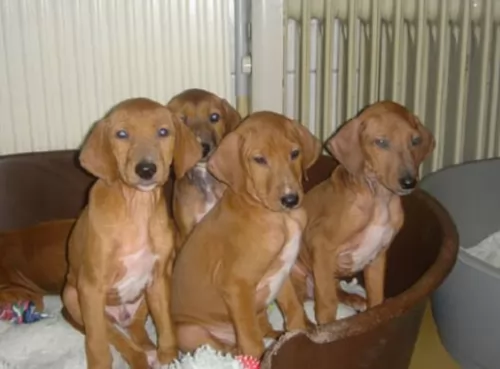 The Azawakh breed is very rare and this kind of information cannot be still guaranteed. If they are bred with a healthy family, they are usually very healthy and don’t need much of the vet care. Some of the diseases that were found in a medical history of this magnificent dog report heart problems (usually caused by their super high need of daily activity), problems with the thyroid glands, and skin diseases caused by the increased secretion of the thyroid glands which causes their skin to become dry and in some cases even the loss of the hair.
The Azawakh breed is very rare and this kind of information cannot be still guaranteed. If they are bred with a healthy family, they are usually very healthy and don’t need much of the vet care. Some of the diseases that were found in a medical history of this magnificent dog report heart problems (usually caused by their super high need of daily activity), problems with the thyroid glands, and skin diseases caused by the increased secretion of the thyroid glands which causes their skin to become dry and in some cases even the loss of the hair.
 The breed itself is known to be healthy but they do face some of the usual health issues of the massive, giant breeds. This includes knee and elbow dislocation; hip dysplasia; bloat; entropion and osteosarcoma. All of these conditions require medical intervention, but bloat and osteosarcoma are the deadliest. Bloat needs immediate attention and osteosarcoma is a deadly bone cancer.
The breed itself is known to be healthy but they do face some of the usual health issues of the massive, giant breeds. This includes knee and elbow dislocation; hip dysplasia; bloat; entropion and osteosarcoma. All of these conditions require medical intervention, but bloat and osteosarcoma are the deadliest. Bloat needs immediate attention and osteosarcoma is a deadly bone cancer.
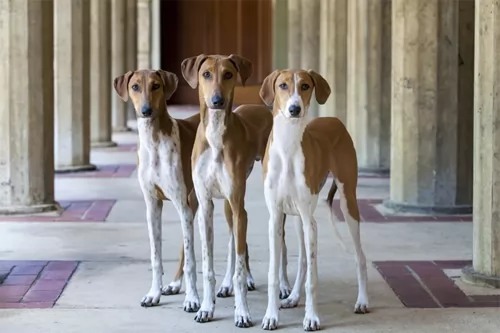 The Azawakh bred has a high risk of the obesity. They must be fed with special care since the food they eat can affect the thyroid glands function. They should never be overfed by average dry dog food. You will be advised to give them food with little percentage of the protein. They drink a lot of water and they like the dairy products. Their meals shouldn’t include fruits and vegetables, and some grains (millet, rice). They do not need to eat a lot of meat, but you can add some chicken in their meals.
The Azawakh bred has a high risk of the obesity. They must be fed with special care since the food they eat can affect the thyroid glands function. They should never be overfed by average dry dog food. You will be advised to give them food with little percentage of the protein. They drink a lot of water and they like the dairy products. Their meals shouldn’t include fruits and vegetables, and some grains (millet, rice). They do not need to eat a lot of meat, but you can add some chicken in their meals.
Puppies should be fed three times per day. Their portions should be small and diverse. Keep in mind to feed them at the same time each day because their metabolism will be formed by this. Adult dogs are fed two times per day, at the same time as well. After the meal, let them rest for an hour or two and never give them meals right after high physical activity.
If you want your Azawakh dog to be healthy and happy make sure you provide them with enough space to run, explore, dig holes and always have some fresh water. They don’t need regular vet checks, but if you notice some changes in their digestion, lower activity or skin abnormalities, it is very important to take them to the vet station. They should never be kept indoors, so if you are living this kind of life maybe this kind of dog is not for you. But, if you are super active and if you have a couple of hours per day to spend with your Azawakh, maybe you can make him feel a lot better.
Since they like the warmer climate, you can take them running with you. They will be a great companion while you bike and leave them leash free but only if he is trained to stay by your side. If you have a yard, make sure to leave some areas free for digging and hiding their special toys or treats. They are extremely playful and cheerful, so they will wander off in no time. Some of the Azawakh dogs were great on the hiking trips, so you can try this daily activity once you train him to listen to you.
 These are large dogs with large appetites, but you want to keep them lean and active. Feed them at least twice a day with a high quality large or giant dog dry food. Four to five cups of food per day is the maximum.
These are large dogs with large appetites, but you want to keep them lean and active. Feed them at least twice a day with a high quality large or giant dog dry food. Four to five cups of food per day is the maximum.
Patellar Luxation – a floating kneecap or dislocated knee. Will cause lameness.
Osteosarcoma – bone cancer must be treated immediately as it is potentially fatal.
The Bulgarian Shepherd needs a good amount of exercise every day. Remember this is a working breed and they need a job. Long walks every day are essential for his well-being.